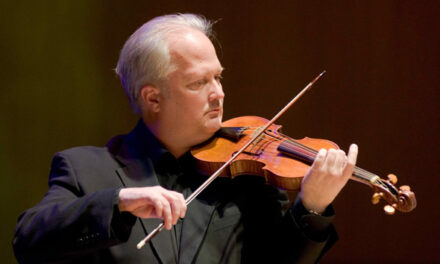Moonlighting at mid-day, as I do on Sundays, being an interim church music director and organist in Pinehurst, I arrived late at Duke Chapel on the afternoon of December 8, looking like those “beside the road whose forms are bending low,” but I was immediately refreshed as I stepped inside the front stone entrance to hear the Chapel Choir’s “And With His Stripes We Are Healed.” Alas, I had missed the Christmas story, but would hear most of Part II through the end.
Imagine a sound better than Bose , streaming through the open space above the rear Flentrop organ loft! The attendant told me that it is the best place in the Chapel to hear the music. And so I rested there “to hear the angels sing.” The Duke University Chapel Choir flourishes from year to year under the impeccable training of Rodney Wynkoop. With the excitement of people rising for the Hallelujah Chorus, I made my way inside to hear the rest of the glorious choral sound. John Lambert has covered Messiah background so thoroughly in other reviews that I shall overlook it here.
At the conclusion, I pressed forward through the exiting throng just in time to catch baritone soloist William Stone to congratulate him and since he was in a hurry, to urge him to watch CVNC for my comments. Posted just in time for Christmas are my compliments for his part in a radiant performance offered for the annual seasonal celebration by conductor Rodney Wynkoop.
Indeed, Stone outshone his quartet peers with his warmly presented story line in the bass solos. He reflects the stature of the great opera houses in which he has been privileged to sing. “The Trumpet Shall Sound” found him sharing mental kudos with Don Eagle, Trumpet I. Van Zimmerman complemented Eagle elsewhere, completing the trumpet section as number II.
The award-winning soloists, soprano Wendi Washington-Hunt and mezzo-soprano Suzanne DuPlantis, presented their recitatives and arias so flawlessly that they didn’t appear to be exceptional. That is a test of true artistry, that the work itself appears to be effortless. However, in a venue the size of Duke Chapel, the solos lack the immediacy and intimate feeling of communication compared to a performance in a smaller space which it has been my pleasure to experience this season.
William Hite, highly acclaimed opera tenor, presented his part of the program fluently but caused no excitement in this listener because his voice did not carry strongly enough to be exciting in the far recesses of the Chapel.
The orchestra, made up of members of area professional performance ensembles and several who play with the North Carolina Symphony, was magnificent. I asked one of them what he thought about the tempi before I went out on a limb to say that the music seemed to run away with itself a couple of times. The loyal musician said he thought the tempi were fine. Nevertheless, I must say that I have worked as a chorus member with such conductors as Hugh Ross, Nicholas Harsanyi, John Nelson, Thor Johnson and others in the annual Winston-Salem presentations and am used to classic slow and steady even when “All We Like Sheep” go astray. The last performance I had heard a year ago in Winston-Salem, led by Sir David Willcocks, was all of that, slow, classic and steady. Once again, it may have been the streaming aspect of the unique position from which I heard it.
Best of all, I like Director Wynkoop’s program notes saying that “…it is remarkable that out of this flurry of composition” (that Handel accomplished in 24 days) “a masterpiece of this magnitude could emerge, a work that always has more to reveal, no matter how many times one hears it.” Everyone should have the Duke Chapel Messiah experience at least once. Quality is found here, but it also lurks in smaller venues equally deserving of support each Advent and Christmas season.
[This Duke Chapel Choir performance of Messiah – and the performance of December 6, too – may be heard and seen over the internet. Go to http://www.chapel.duke.edu/ , click on “Streaming Media” in the left-hand panel, scroll to the bottom of the page, click on the drop-down beside “Genre,” click on “Choir,” and then select one of the two streamed performances. Readers may also wish to note that the Choral Society of Durham’s recent holiday concert may also be enjoyed online, along with a variety of other programs dating back to 1994.]
On December 23, if I lived nearer Raleigh, I would be at William Weisser’s postponed Edenton Street Methodist Church Messiah singalong, but I now find myself unexpectedly deep in pursuit of volunteer soloists to carry on the Fifth Annual Handel On Hunger singalong in the Sandhills, which in previous years has been conducted by William Henry Curry, Stephen Simon, Ben Siegel Johnson, and Paul Chandley, the executive director of Trinity Music Academy in Troy, who returns to direct again this year. The keyboardist will be his Sofia Chandley, formerly a member of the Kiev Symphony, presenter of many Messiah s. The soloists will include soprano Jennifer Thomas, of Southern Pines, who has sung with the Opera Company of Boston. Jeff Kerr, the volunteer orchestra manager, has had the instrumentalists waiting in the wings since Thanksgiving. The Fifth Annual Handel On Hunger event in the Sandhills community, benefiting the Coalition for Human Care in Southern Pines, begins at 7:00 p.m. on Twelfth Night, January 5, 2003, at The Village Chapel (http://www.thevillagechapel.net/ [inactive 9/05]), Route 2, Pinehurst. All are welcome to bring an offering with which the Coalition can buy food for the hungry. It won’t hold a candle to Duke’s singalong or concert performances, but it will light up many lives. Check the CVNC calendar for updates as additional soloists are engaged.












